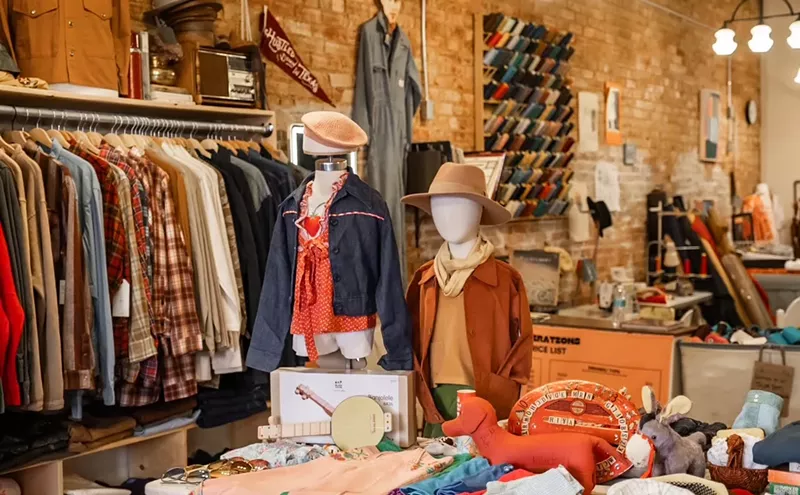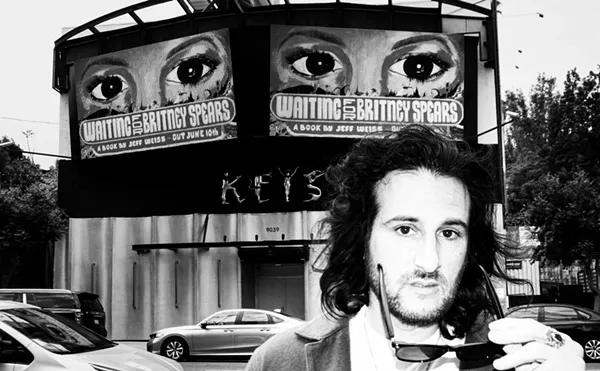Death never takes a holiday in the plays of Martin McDonagh. It's always right there in the room, or at least close by, lurking, stalking.
He populates his scripts with nasty old ladies, drunken louts and bad-tempered cops—potential murderers all. Insanely funny conversations about trivial matters erupt into bitter confrontations that lead to the shock of watching an actor suddenly aim a fireplace poker or hammer or loaded gun at another actor's head. And then, because McDonagh likes it this way, there's usually a brutal killing in full view of the audience.
That might or might not be what happens in A Skull in Connemara, one of McDonagh's blackest, bleakest Irish comedies, now running at Second Thought Theatre in Addison. Giving away precisely what provokes the big gasps would risk trespassing into the spoiler zone, but if you've seen any of his other plays—namely The Pillowman, recently produced at Kitchen Dog, or The Beauty Queen of Leenane—you'd be well-advised to remember how they ended. If you're prone to stomach flutters, seat yourself well back from the acting area.
Dead bodies abound in Skull, two hours of ghosts, guilt and graveyards. But the majority of the corpses in this one have had plenty of time to molder. After an opening scene set in the small, sad Galway cottage of middle-aged widower Mick Dowd (played by John S. Davies), the walls (by Clare Floyd DeVries) slide away to reveal a weedy parish cemetery. There, Mick and his young helper Mairtin Hanlon (Drew Wall) spend part of every autumn disinterring old coffins by night and pulverizing the remains, the priest's way of recycling plots to make room for the newly departed.
The chore is fraught with meaning for Mick this time around. He's due to empty his wife's grave. There've been rumors in the village about how she died seven years earlier. Mick claims he was drunk at the wheel. Others believe she was dead by his hand before the accident. A look at her skull might reveal the truth. Mairtin's older brother Thomas (Ian Sinclair), the local Barney Fife, shows up for the midnight exhumation. He would love to make his bones as a detective by pinning murder charges on Mick.
But that's only part of the story. More than one skull ends up grinning at Mick from his kitchen table in the play's second act, which gets stranger and meaner by the minute. Before going at the piles of splintered remains with wooden mallets, Mick and Mairtin get juiced on a potent Irish moonshine called poteen and fiddle with the unearthed bits. Mairtin prances around in a skull bra for laughs and presses two fleshless heads together to kiss like ghoulish Dutch dolls. "This is more fun than cookin' hamsters," he cracks, referring to a gruesome classroom prank.
Before the suspicions about Mick's dead wife are put to rest, there are other scores to settle, such as the long-festering fuss between Mick and Mary Rafferty (Carolyn Wickwire), the sour biddy who drops in nightly to cadge a free drink on her way home from bingo. And between Mick and Mairtin, and Mairtin and Thomas. Blood is spilled in the play, but just as he's done in his others, McDonagh builds in a MacGuffin to throw off any hounds who try to sniff out the ending too easily.
There's plenty to dig about Second Thought's ambitious staging of A Skull in Connemara (the title comes from one of Lucky's lines in Waiting for Godot). The second act is a ticking time-bomb of pent-up emotions and potential for violence. But the company falls short of getting it all right, coming nowhere close to the tension and depth of the performances in Kitchen Dog's Pillowman.
Under the artless direction of T. A. Taylor, the four actors in Skull too often flail when they should be focused. Their pacing is shoddy in the opening scenes, which feel overacted and under-directed. Talk never flows as naturally as written. Burdened with attempting the accents of rural Ireland, Second Thought's ensemble struggles with McDonagh's vernacular ("oul" for "old," for instance). Davies never nails the Gaelic brogue, lapsing into a drawl closer to Dublin, Texas.
What's missing more than a convincing accent in Davies' performance is a sense that his Mick poses a threat to the other characters (or to his wife seven years prior). Davies is a tall, hulking man who brings world-weariness to every part he plays, but as Mick he's about as menacing as an overstuffed armchair. He's also prone to relying on the same squints, shrugs and growls whether he's playing the feeble Colonel Kinkaid of The Oldest Living Graduate (last year at Contemporary Theatre), a New York cop in West Side Story (Lyric Stage) or the gravedigger in Skull.
Wall, a younger, cuter Steve Buscemi type, does better as the gormless Mairtin. What he lacks in vocal tricks, he more than makes up for in movement. In the bone-smashing scene, Wall is all skinny legs and elbows, jumping around like a spastic marionette. He's Skull's hilariously antic numbskull.
As the yammering neighbor, Wickwire does her best work in the second act. The actress is something of a McDonagh specialist these days, having played this same role in Stage West's production. She also was stunning some years back as Mag, the undermining mother opposite Julie Painter's old-maid daughter in Collin College's Beauty Queen of Leenane.
Skull, Leenane and The Lonesome West make up one of McDonagh's two Irish-themed trilogies. Those six plays, plus The Pillowman, were written, all or in part, during a rush of creativity in 1994, when the playwright was only 24. Still shy of 40, McDonagh has written no other plays since. Instead he's moved on to film directing. In Bruges, his first feature, released in 2008, is about a pair of hitmen who hide out in Belgium after the accidental death of a child.
"Graveyard shenanigans," as they're called in Skull, have become Martin McDonagh's paydirt.
The big buzz in Dallas theater circles for weeks has been the naming of Dallas Theater Center's new repertory acting company. There hasn't been a resident ensemble at DTC since the 1980s, and with theater business hurting everywhere (15 Broadway shows are being forced to close this month), the promise of steady employment at a major regional theater is a boon.
Most of the company will be familiar to audiences at DTC and Kitchen Dog Theater. Lee Trull and Sally Vahle starred together in KDT's Depression-era drama End Times. Christina Vela directs and acts at KDT, most recently co-starring in Richard III. Matthew Gray, founder of now-defunct Classical Acting Company, has become a regular at DTC with roles in Cat on a Hot Tin Roof and A Christmas Carol. Cedric Neal played the lead in DTC's season opener Tommy, with Liz Mikel as the Acid Queen. Chamblee Ferguson has long been an all-around utility player in Dallas theaters including DTC, where he has played Bob Cratchit in A Christmas Carol for several seasons. Newcomer Hassan El-Amin was just seen in Carol as Jacob Marley's Ghost. His long list of credits includes roles at the Guthrie, San Diego Rep and Arena Stage. Sean Hennigan was a company member in the 1980s and returned to the DTC stage in 2007 in Glengarry Glen Ross.
All of the new company members are in the cast of the biblical play In the Beginning, directed by Kevin Moriarty and opening January 21.












